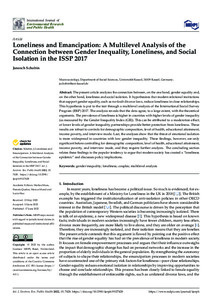| dc.date.accessioned | 2022-08-26T08:20:00Z | |
| dc.date.available | 2022-08-26T08:20:00Z | |
| dc.date.issued | 2022-06-17 | |
| dc.identifier | doi:10.17170/kobra-202208266762 | ger |
| dc.identifier.uri | http://hdl.handle.net/123456789/14103 | |
| dc.description.sponsorship | Gefördert durch den Publikationsfonds der Universität Kassel | ger |
| dc.language.iso | eng | ger |
| dc.rights | Namensnennung 4.0 International | * |
| dc.rights.uri | http://creativecommons.org/licenses/by/4.0/ | * |
| dc.subject | gender inequality | eng |
| dc.subject | loneliness | eng |
| dc.subject | couples | eng |
| dc.subject | multilevel analysis | eng |
| dc.subject.ddc | 300 | ger |
| dc.title | Loneliness and Emancipation: A Multilevel Analysis of the Connection between Gender Inequality, Loneliness, and Social Isolation in the ISSP 2017 | ger |
| dc.type | Aufsatz | ger |
| dcterms.abstract | The present article analyzes the connection between, on the one hand, gender equality and, on the other hand, loneliness and social isolation. It hypothesizes that modern relational institutions that support gender equality, such as no-fault divorce laws, reduce loneliness in close relationships. This hypothesis is put to the test through a multilevel analysis of the International Social Survey Program (ISSP) 2017. The analysis reveals that the data agree, to a large extent, with the theoretical arguments. The prevalence of loneliness is higher in countries with higher levels of gender inequality (as measured by the Gender Inequality Index (GII)). This can be attributed to a moderation effect; at lower levels of gender inequality, partnerships provide better protection from loneliness. These results are robust to controls for demographic composition, level of health, educational attainment, income poverty, and interview mode. Last, the analyses show that the threat of emotional isolation is more widespread in countries with low gender inequality.
These findings, however, are only significant before controlling for demographic composition, level of health, educational attainment, income poverty, and interview mode, and they require further analysis. The concluding section relates these findings to the popular tendency to argue that modern society has created a “loneliness epidemic” and discusses policy implications. | ger |
| dcterms.accessRights | open access | ger |
| dcterms.creator | Schobin, Janosch | |
| dc.relation.doi | doi:10.3390/ijerph19127428 | |
| dc.subject.swd | ISSP | ger |
| dc.subject.swd | Geschlechterforschung | ger |
| dc.subject.swd | Isolation <Soziologie> | ger |
| dc.subject.swd | Emanzipation | ger |
| dc.subject.swd | Sozialer Indikator | ger |
| dc.subject.swd | Gleichbehandlung | ger |
| dc.subject.swd | Sozialpolitik | ger |
| dc.subject.swd | Politische Unterstützung | ger |
| dc.subject.swd | Paar | ger |
| dc.type.version | publishedVersion | ger |
| dcterms.source.identifier | eissn:1660-4601 | ger |
| dcterms.source.issue | Issue 12 | ger |
| dcterms.source.journal | International Journal of Environmental Research and Public Health | ger |
| dcterms.source.volume | Volume 19 | ger |
| kup.iskup | false | ger |
| dcterms.source.articlenumber | 7428 | |


